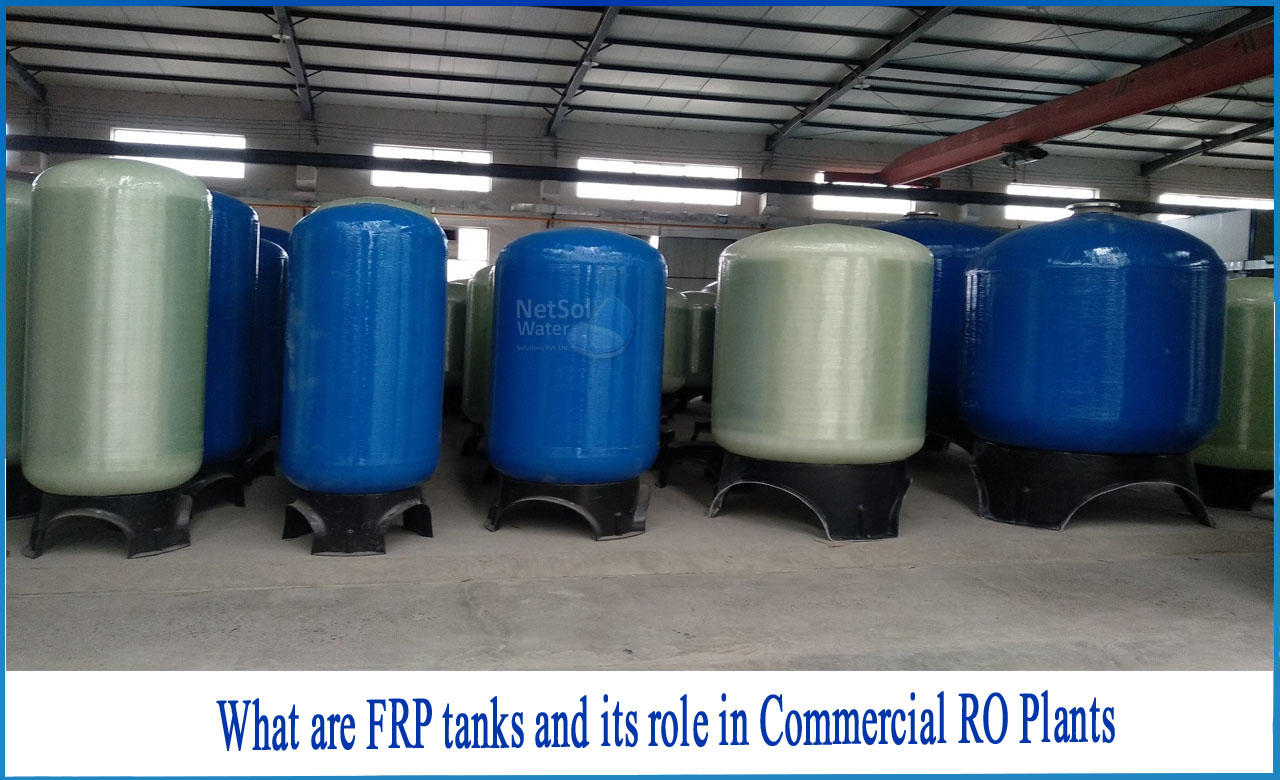What are FRP tanks and its role in Commercial RO plants?
Fibre-reinforced plastic (FRP), sometimes known as fibre-reinforced polymer or fibre, is a composite material comprised of a polymer matrix reinforced with fibres. Glass (in fibreglass), carbon (in carbon-fibre-reinforced polymer), aramid, or basalt are the most common fibres. Other fibres, such as wood, paper, or asbestos, have been utilized on rare occasions. Although phenol formaldehyde resins are still used, the polymer is commonly an epoxy, vinyl ester, or polyester thermosetting plastic.
The tank can be manufactured entirely of FRP or a second liner can be employed due to the corrosion resistance of the composite. In each scenario, the inner liner is manufactured from a different material than the structural component {thus the names dual (meaning two) and laminate (a term for a composite material layer)}.
A hydrostatic tank is a suitable use for FRP because of its buckling weakness but enormous strength against tensile stresses and corrosion resistance. By aligning the fibres in the tangential direction, the tank is intended to withstand the hydrostatic forces necessary. This strengthens the hoop, making the tanks more an-isotropically robust than steel (pound per pound).
The structural strength required to endure design circumstances such as internal pressure or vacuum, hydrostatic loads, seismic loads (including fluid sloshing), wind loads, regeneration hydrostatic loads, and even snow loads is provided by FRP that is built above the liner.
Applications of FRP Tanks
An inlet, an outlet, a vent, an access port, a drain, and an overflow nozzle are all included in a conventional FRP storage tank. Other features, on the other hand, can be added to the tank. Outside ladders provide convenient access to the roof for loading. The vessel must be able to support the weight of a person standing on these ladders, as well as a person standing on the roof. Drainage is made easier with slanted bottoms. The liquid level in the tank can be reliably measured using level gauges. The vessel needs to be able to withstand the corrosive character of the fluid it holds. In the event that the vessel explodes, these vessels usually incorporate a secondary containment system.
Fertilizer, paper and metal extraction,wood pulp, refining, electroplating, brine, vinegar, food processing, and air pollution control equipment, particularly at municipal wastewater treatment plants and water treatment plants, all use FRP tanks and vessels.
Role of FRP Tanks in Commercial RO Plants
FRP vessels are mostly utilized in treatment facilities to treat water. Iron Removal Plants (IRP), Fluoride Treatment Plants (FRP), and Arsenic Treatment Plants (ARP) are all used to filter water in some way.Thus, they play an important role in the Reverse osmosis systems.
The service life of reverse osmosis membranes is directly affected by the preparation of FRP RO Membrane Housing reinforced plastic membranes. Regardless matter whether the feed water is surface water or groundwater, certain organic and inorganic contaminants will be present. These contaminants and suspended particles will remain on the surface of the membrane if they are not processed and fed straight into the reverse osmosis system for operation, resulting in runner obstruction, increased membrane component pressure, and water production. The volume and pace of desalination decrease, and this might have major repercussions such as membrane fouling or damage.
Conclusion
FRP pressure vessels are utilized in a variety of industries, including thermal power plants and projects, dye, pharmaceuticals, insecticides, and so on. Though it does not appear to be a fancy product for everyday use, it is undoubtedly a groundbreaking invention that has simplified a number of technical procedures. It is a critical component in many industries and is still in use today.
What can we offer?
You can reap the benefits of re-using pure water by simply using Netsol’s RO Plant which is dedicated to provide a great purity of water.
We as water treatment experts, can help you with water reuse and conservation in your operations, as well as the optimization of existing water production and the design and building of new, energy-efficient, and environmentally friendly water treatment systems. Our products and solutions can provide the water your plant requires at every stage!
Let us know your problem, our experts will make sure that it goes away!
For further assistance or product purchase related query,
Call us on +91-9650608473;
Or, write us at enquiry@netsolwater.com



